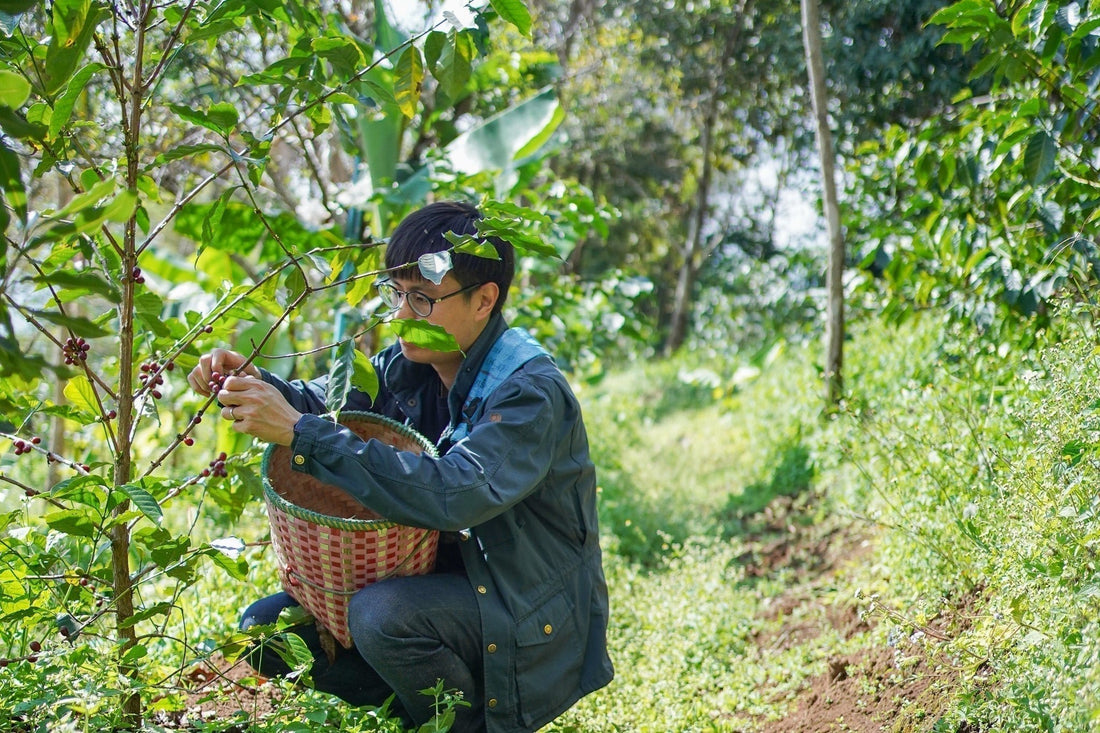This January, the Newbery Street Coffee Roasters team embarked on an unforgettable journey to Thailand to visit our dedicated coffee producers. We had the incredible opportunity to pick, process, roast, and brew coffee alongside them. Our annual farm visits are always a highlight, allowing us to witness the progress of their coffee projects—whether it's a new farm, an innovative processing method, or even a new home they've built. But the best part? Brewing and tasting coffee together, sharing in the pride of their hard work and dedication.
Our adventure began with a visit to our close friends, Billy and Charn, in Maemon, Chiang Rai. From the very start of my coffee journey, these two have been pivotal figures in the specialty coffee industry for me. If you’ve ever heard my story, you’d know how they introduced me to the world of coffee. One of the things I love most about visiting Billy is experiencing the authentic Akha cuisine, a tradition of the northern Thai tribes. The freshness of their ingredients, sourced directly from nearby farms, creates a dining experience that’s both nourishing and unforgettable.

Back in 2022, in collaboration with I AM NOT BARISTA, we donated 750 Geisha and Java coffee plants to multiple farmers in Thailand, and Billy was among the recipients. On our first day, we visited the Gesha and Java plants at his farm. They’ve grown tall and are already bearing fruit! Though the yield is still small, we were able to harvest a few cherries to process and roast as samples. Billy’s goal is to export these Gesha beans to Newbery Street Coffee Roasters in Boston next year—something we are incredibly excited about.

The next morning, we set off for Chiang Mai to visit three remarkable producers: Nui and Aoi in Doi Saket, Aek Suwanno in Mae Ton Luang, and Jaroon in Khun Lao. Our first stop was Nui and Aoi’s farm, where we were warmly greeted by their daughter, Torfan, whose name means “Weaver of Hope.” Watching her grow over the years has been heartwarming—now, she helps her parents bake, pick coffee, and even experiment with her own tiny coffee batches.

One of the most exciting moments of our visit was working on a special fermentation process with Nui and Aoi. This year, we mixed yogurt with the coffee cherries before sealing them in fermentation tanks. That’s right—yogurt! We don’t know the final flavor outcome yet, but we anticipate a beautifully complex lactic acidity. Next month, you’ll be the first to try it! We also had the pleasure of brewing coffee roasted by our friend Ploy from Sauce Coffee in Thailand.

By noon, we drove 20-30 minutes to our next stop—one of the most talented coffee processors in Thailand, Aek Suwanno from The First Valley Coffee. If you know Thai coffee, you likely know Aek. We featured his coffee last year in 2024 and have always admired his work. As he guided us through his farm, he emphasized the crucial role of soil quality in coffee cultivation, explaining how it ensures consistent flavors and quality year after year. His processing facility left us in awe—equipped with advanced technology to regulate temperature and moisture, it was pristine and meticulously organized. It was clear why his coffee stands out: his dedication is unparalleled. After enjoying a cup together and discussing his future plans, we set off for lunch before our next visit.

In the afternoon, we arrived at Jaroon Farm, where we were treated to a delicious meal prepared by Songkran, Jaroon’s wife. The flavors were rich and deeply satisfying—a perfect prelude to exploring the farm. What impressed us most were the towering coffee trees, some reaching nearly three meters, significantly taller than the average in Thailand. This farm's environment, with its natural shade from surrounding trees, allows for larger coffee cherries.
Before growing coffee, Jaroon’s family had cultivated Assam tea for over 50 years. However, tea production wasn’t generating enough income to support his family, particularly for his children’s education. Observing his neighbors’ success with coffee, he decided to make the switch—and it turned out to be a life-changing decision. After touring the farm, we brewed some coffee together, including the double honey process batch that’s currently available on our website.

Then, we returned to Maemon to spend another day with Billy, picking coffee and working on our special natural dried banana process coffee, before traveling to Doi Chang to visit another producer we admire—Nawin. We roasted his honey process coffee in 2024, and this trip finally gave us the chance to see firsthand how he produces and processes his beautiful coffee.
Nawin’s farm is vast, and we were honored to have him personally guide us through it, sharing insights into his sustainability initiatives at his processing station. Many of our farmers strive to minimize waste, but Nawin takes it to the next level. With such a large processing station, he has developed innovative ways to reduce waste, including creating his own water filtration system and repurposing cascara (coffee cherry husks) into organic fertilizer. He even shares this eco-friendly, chemical-free fertilizer with local vegetable farmers, contributing to both environmental preservation and community agriculture.

After exploring his farm, we visited Nawin’s café, where we brewed a stunning honey process coffee—one that we had roasted at Newbery Street—with him.
Every visit leaves us with unforgettable memories, but more importantly, it allows us to check in on our farmer partners—seeing how they’re doing, hearing their stories, and witnessing their growth year after year. It’s always a joy to see their smiles and share in their journeys.

Beyond the heartfelt connections, these trips ensure we bring back incredible coffee to Boston—coffee with a story, a purpose, and a soul. And yes, you read that right! We’re bringing this extraordinary coffee and its journey to you. Let’s continue exploring and appreciating coffee together at Newbery Street. Thank you for reading to the end—I hope you're as excited as we are for the new Thai coffees coming your way!

